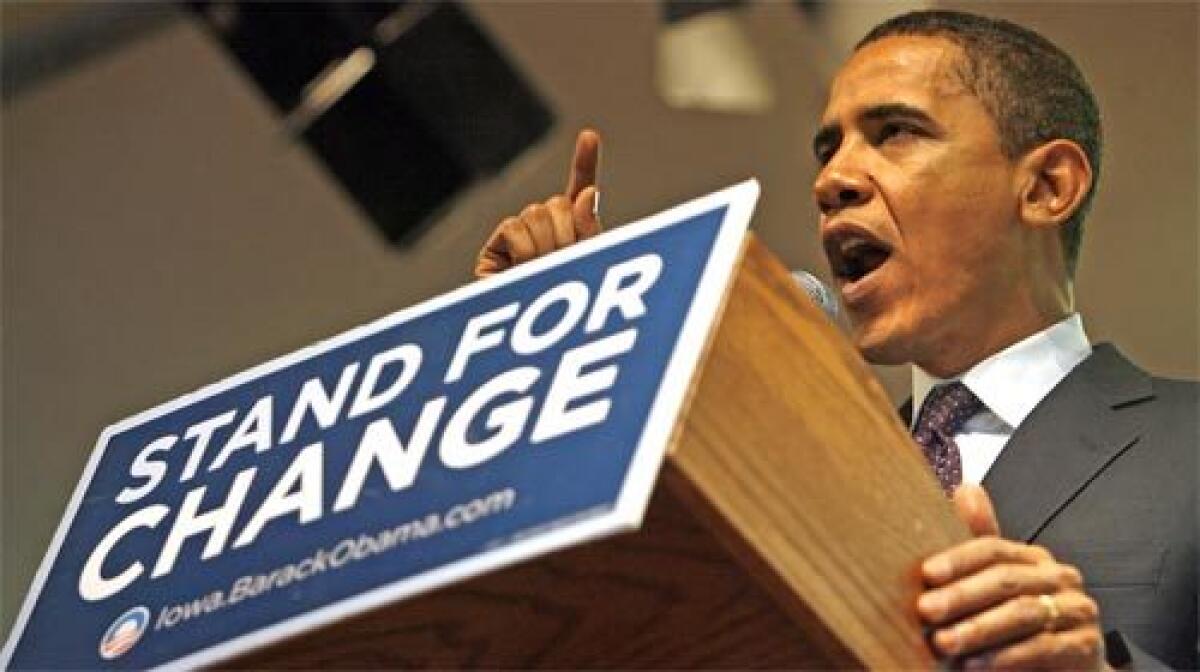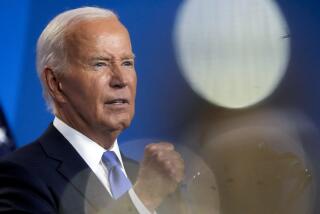Iowa Democrats look to pick a winner

- Share via
KNOXVILLE, IOWA — As the front-running Democratic presidential hopefuls barnstorm this snowy state in the final days before the caucuses, Barack Obama, Hillary Rodham Clinton and John Edwards agree on at least one thing: Voters should choose the candidate who will be most electable in November.
But they disagree, naturally, on who fits the bill.
Clinton and her supporters say she’s been battle-tested by the “Republican attack machine,” during her eight years in the White House and two successful Senate runs. Edwards touts his experience as the party’s vice presidential candidate in 2004 and his appeal to rural America. Obama points to his promise to unite the country. And both men cite polls.
“The latest polls show I am the only Democrat who is beating every single Republican in a head-to-head matchup,” Illinois Sen. Obama said in a packed middle school auditorium. “I beat Romney. I beat Thompson. I beat Huckabee. They didn’t poll what I’m doing against Ron Paul, but I’m going to beat him too.”
The state’s first-in-the-nation caucuses are Thursday, and as the virtually tied Democrats deliver their closing arguments, the ability to triumph in November is a constant thread.
“Every election there’s a certain cycle. It’s all about fundraising up front, but in the end it all comes down to electability,” said Jano Cabrera, a Democratic strategist who worked in the presidential campaigns of Al Gore in 2000 and Joe Lieberman in 2004. “Electability has a way of shifting the sands under a candidate’s feet.”
It’s also a prime concern to the state’s Democratic electorate, frustrated by seven years of the Bush administration.
Undecided voter Molly Shedek, 27, of Cedar Rapids appreciates Connecticut Sen. Christopher J. Dodd’s resume, but she doubts she’ll caucus for him.
“I don’t think he’s as electable as the front-runners, and I want a Democrat in office in 2008,” said the high school English teacher, who went to see Clinton in Vinton on Sunday. “That is really important to me.”
Sen. John F. Kerry (D-Mass.) played the electability card in 2004, and many believe it catapulted him to a surprise first-place finish in Iowa that year. Democrats Bill Bradley in 2000 and Howard Dean in 2004 suffered because of their perceived lack of electability, Cabrera said.
“The primary process is about dating. As the vote gets closer, you begin to wonder, Can this person win? It’s like when you’re getting close to walking down the aisle with someone,” he said. “That explains why Bradley was as hot as he was initially, why Dean flared as hot as he did, but ultimately why people went with establishment candidates like Gore and Kerry.”
Sen. Clinton of New York is arguing that a combination of experience and electability make her the best candidate for the Democratic nod. She campaigned across eastern Iowa on Saturday with Ohio’s Democratic Gov. Ted Strickland, who said he endorsed her because she could win.
“I can tell you as governor of the state of Ohio, the state that may be the single most important battleground state in this country, I’m endorsing Sen. Clinton because she’s the one who can win November the 4th, 2008,” he told a crowd of hundreds spilling out of a Dubuque ballroom. “She is the most vetted candidate ever. [Republicans] have tried millions of dollars and years of effort to undermine her and to defeat her and to destroy her and yet she has won two landslide elections to be New York’s United States senator.”
Obama has countered that Clinton is a polarizing figure.
“We are less likely to win an election that starts off with half the country not wanting to vote for that candidate,” he told CNN.
He tells voters his ability to unite people of differing backgrounds and political persuasions makes him electable.
In one of his best-received bits of campaign trail shtick, Obama often drops his voice to a very loud stage whisper and recounts rope-line conversations he has with wary voters.
“ ‘I’m a Republican, and I’m going to vote for you,’ ” he quotes the surreptitious voters. “ ‘Thank you,’ I tell them, ‘but why are we whispering?’ ”
He told the supportive crowd of several hundred in Knoxville that he hears as much frustration with the country’s status quo from Republicans and independents as he does from Democrats. Reaching out to disaffected voters, he said, is the best way to make change. It is also, he said, “how you win elections.”
While Obama relies on a Dec. 12-14 Zogby poll to argue he’s the most electable, former North Carolina Sen. Edwards notes a Dec. 6-9 CNN poll that indicated Edwards was the sole Democrat who would beat Republican presidential hopefuls Mike Huckabee, John McCain, Mitt Romney and Rudolph W. Giuliani in head-to-head match-ups. Edwards also peppers his populist rhetoric with references to his rural roots and ability to appeal to voters in red states.
“The one candidate that beats every Republican is me, and that’s not unimportant,” he said Thursday at an Amvets meeting hall in Waverly. “We’re going to have a fight on our hands between now and next November, and we better send someone into that fight who knows what they’re doing, who’s been through it, who’s tough, who’s seasoned.”
Dan Schultice, 36, was leaning toward Edwards when he walked into the Newton Senior High School gym Sunday to hear Obama speak. He walked out leaning toward Obama.
“I really like the way he talks about mending things between the two parties,” he said. “He’s better at that than John Edwards. He might be able to bring moderate Republicans to his side. He’s very electable.”
He added: “It’s important to have somebody that’s able to win.”
Mehta reported from Vinton and La Ganga from Knoxville. Times staff writer Mark Z. Barabak and researcher Nona Yates contributed to this report.
More to Read
Sign up for Essential California
The most important California stories and recommendations in your inbox every morning.
You may occasionally receive promotional content from the Los Angeles Times.












